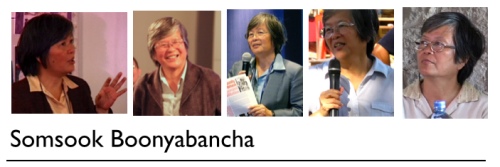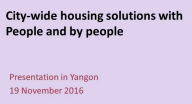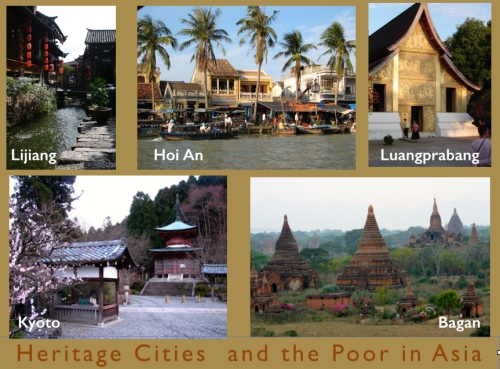- Home
- About us
- Activities
-
About us
- News & Update
- Library
- Countries
- extra
- contact
activities
Click Show/hide
Understanding Asian Cities
Nurturing Asia-specific ways of making change
Asia has its own, very significant, history, culture(s) and politics. In particular, its political culture has very deep roots. These groups in the ACHR network are made up of people who have a complex and subtle understanding of Asia's political realities, its feudalistic social and behavioural patterns, and its institutional traditions. They have aligned to manoeuvre within these traditions to make things work for the urban poor, with new ideas and innovations that support systemic and structural change. If principles of participation, democracy, accountable government and citizen inclusion are to be realised in Asia, links have to be made between these institutional traditions and new realities. There are Asian ways of doing things that make change in the Asian context.
Hence ACHR members have contributed their own research and articles relevant to making change in Asia. Below are just a few recommended contributions from ACHR friends around Asia. There are of course many more in the downloads LIBRARY.
Understanding Asian Cities Booklet ...
A synthesi s of the findings from 8 city case studies on how the urban poor are fairing.
Citeis include: Chiangmai, Phnom Penh, Pune, Karaxhi, Multinlupa, Hanoi, Bejing (old section)
Edited by David Satterthwaite October, 2005
 PDF file 1.6 megabytes - text & photos
PDF file 1.6 megabytes - text & photosThe Research and Writing of Arif Hasan

Arif Hasan is a Pakistani architect and planner, activist, teacher, social researcher and writer. He studied architecture at the Oxford Polytechnic, worked in Europe in architect’s offices, and on his return to Karachi in 1968, established an independent practice which slowly evolved into dealing with national and international urban planning and development issues. He has taught at Pakistani and European universities and lectured widely both in the North and the South,
Arif has written and researched extensivly and now has a website where you can explore: Go HERE to Arif Hasan's website.
August 2018
Housing: Pakistan Report By Arif Hasan with Hamza Arif Draft 5 Aujust 2018
Prepared for the Asian Coalition of Housing Rights as part of a larger Development and Planning Unit, University College London, Project.
Pakistan is the seventh most populist country in the world. According to the 2017 Census, its population is 207.7 million and has grown at the rate of 2.4% per year in the intercensalperiod. Its urban population, on the other hand, has grown at the rate of 2.7% per year during the same period and is estimated at 75.5 million.
Continue reading the 26 page report
 110K
110KARCHI TIMES OCTOBER 2016
Interview with Arif Hasan
ARCHITECT OF THE MONTH
In this interview Arif talks about the role of Architecture in society and gives exampleofboth positive and negative projects. Also the relations and influences between the architects and clients; He talks the late Perween Rahman’s contribution to society and influence on the Orangi Pilot Project.
He discusses the change from Modernism to Neo-liberalism and western celebrity architects and discusses the future of architecture around the world and in Karachi.
Read the interview :
 PDF 833 KBS
PDF 833 KBSJan 2017:Karachi Diagnostic Article by Arif Hasan "Consultants often know little about the complex ways in which Karachi functions, ....
from The Dawn newspaper Pakistan

Sept 2016:
For a list and links to Arif Hasan’s Articles, Books Published, Book contributions and his support for various films — download the Word Doc HERE with close to 30 titles with links: (27KB)
ARIF HASAN Published Material (2006 -2015)

Arif has published a number paper available for downlaod here from February 2015
Value Extraction from Land and Real Estate in Karachi : 21 Oct 2013
This paper does not theorise nor does it challenge any theory of gentrification. It seeks to show how land-use changes and extracting value from real estate takes place in Karachi, a global south mega city. This process of extracting value pushes out poor communities from the land and homes of their ancestors and replaces them with richer and/or more politically powerful groups. These processes are very different from those in the global north. It also seeks to show
 11 pages 251 Kbs Word doc.
11 pages 251 Kbs Word doc.Between the people and the polis Southasia’s mega-cities and the urban future
Arif Hasan delivered the prestigious HIMAL Annual Lecture in Dehli at the India International Centre on 25 November 2014.
 transcript of the lecture . 8 pages Word doc 36 KB
transcript of the lecture . 8 pages Word doc 36 KBThe Impact of Globalisation and Regional Conflict on the Loom Units in Dibba Colony, Karachi
By Arif Hasan with Mansoor Raza (Initial Draft; 07 July 2014)
Reason for the Study The textile industry is considered to be the backbone of Pakistan’s economy. Much of its weaving sector looms operate informally out of low income settlements. This informal loom sector has been facing a number of problems due to which land-use changes, migration patterns and a search for new forms of livelihood have emerged. This study is an initial exploration in trying to understand the causes behind these changes and their repercussions on a small settlement of about 25,000 persons in Karachi. But first, let us look at the textile industry and how it operates.
 15 pages Word Doc 69 KB
15 pages Word Doc 69 KB
By Arif Hasan with the Urban Resource Centre, Karachi and Mansoor Raza
(Draft; 08 January 2015)
 48 pages Word Doc 5.2.Mgbs
48 pages Word Doc 5.2.MgbsEarlier papers:
THE CHANGING SOCIOLOGY OF KARACHI: CAUSES, TRENDS AND REPERCUSSIONS
 PDF 139 KB 8 pages
PDF 139 KB 8 pagesRESIDENTIAL DENSITY ISSUES: THE CASE OF KARACHI
 11 August 2011. PDF 85KB 3 pages
11 August 2011. PDF 85KB 3 pagesArchitecture: Then and Now .... Arif tracks the changes in being an Architect, over his career, in Pakistan ....a short essay .... Read More
For MORE: Go HERE Arif Hasan's website.
A selection of Writing and Video presenations from Somsook Boonyabancha

is the Sec Gen. of ACHR .... below are some links to video and documents exemplifying how the urban poor themselves are the key actors in implementing effective poverty alleviation in Asian cities.
 City Wide Housing Solutions
City Wide Housing Solutions By and With The People
Nov 2016.
An illustrated talk by Somsook Boonyabancha in Burma via Youtube: HERE
2016:
From the SDI site
Scaling Up Informal Settlement Upgrading: The CODI Model Thailand
By Yolande Hendler (on behalf of CORC) While the value of in-situ informal settlement upgrading is increasingly recognised by national and global actors ….
SASDIALLIANCE.ORG.ZA
http://sasdialliance.org.za/scaling-up-informal-settlement…/
URBAN POVERTY REDUCTION: LEARNING BY DOING IN ASIA: SOMSOOK BOONYABANCHA AND DIANA MITLIN
ABSTRACT This paper describes the Asian Coalition for Community Action (ACCA) programme that was initiated by the Asian Coalition for Housing Rights (ACHR) in 2009.
 19 pages 636 KB October 2012
19 pages 636 KB October 2012Presentation on Community Driven Citywide Slum Upgrading: Lessons Learned from Thailand to East Asia by Somsook Boonyabancha
Video thanks to the World Bank and the E-Institute . You can see the webinar / video presentation Here 60 mins
"Financing Grassroots Development at Scalez" in London in January 2013, on YouTube here Video: 90 min presentation
Unlocking People Energy - People and cities in Thailand ( download coming soon )
 Kirtee Shah
Kirtee Shah 2016: Kirtee Shah Interview- Humanitarian Architects
Must read Kirtee Shah Interview- Humanitarian Architects KIRTEESHAH.WORDPRESS.COM
https://kirteeshah.wordpress.com/…/kirtee-shah-interview-…/…
Sept 2015: While ACHR starts thinking about what it wants to do with Habitat 3 let Kirtee share with you a note submitted to the Government of India on how it could possibly use Habitat 3, the global event next year at Quito, Ecuador, to present its new initiatives on Housing for All by 2022 and making the Indian cities better places to live, work and invest to the global community as also its own people.
As you know, Sustainable Cities and Housing for All are the key themes of Habitat 3.
 11 pages teaxt ( only 111 Kbs )
11 pages teaxt ( only 111 Kbs )Architects and the Poor - India ( download coming soon )
 Fr Jorge Anzorena
Fr Jorge AnzorenaWhat I have learned in 34 years" of visiting urban poor communities and supporters in Asia. A transcript of
Father Jorge Anzorena, speaking at the ACHR Regional Meeting in Bangkok, January 27, 2011
 PDF1.4. MG
PDF1.4. MGPreservation for the Poor

Historic districts in Asian Cities often preserve traditional social networks and traditional building skills, and in a rapidly-changing world represent values and identity. In practical terms, old urban districts also offer affordable housing to low-income communities. All too often, when the heritage aspect is "discovered", i the low-income communities are pushed out, and traditional intangible structures also disappear.
We shall be posting findings from ACHR research into this aspect of Asian cities soon.
Cities in ACHR's Heritage and the Poor Project include:
Hoi An -Vietnam Lijiang - China, Bhaktapur - Nepal Luangprabang - Lao PDR Kobe -Japan Bagan - Myanmar
More reading:
Some notes from presentations at the Community Architects Meeting Chiangmai
LHASA, TIBET : Andre Alexander YUSHU, TIBET : Ms. Anna Wozniak. SOUTH GOBI PROVINCE, MONGOLIA : Pimpim de Azevedo. PATHAN, NEPAL : Surya Bhakta Sangachhe
Part 1 Download here Problem with DL to be fixed soon
KOCHI CITY, JAPAN : Mr. Yoko Hatakenaka GEORGETOWN in PENANG, MALAYSIA : Mr. Ooi Bok Kim CHINATOWN in BANGKOK, THAILAND : Mr. Sakkarin Sapu BANGKOK, THAILAND : Ms. Niramon Kulsrisombat SONGKHLA, THAILAND : Mr. Thip Srisakulchairak
Part 2 Download Here Problem with DL to be fixed soon
 For readings on Tibetan heritage visit the website of our friends from The Tibet Heritage Foundation HERE
For readings on Tibetan heritage visit the website of our friends from The Tibet Heritage Foundation HERE



